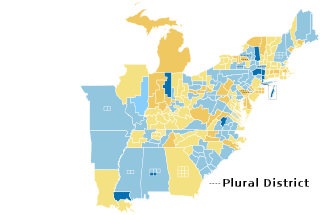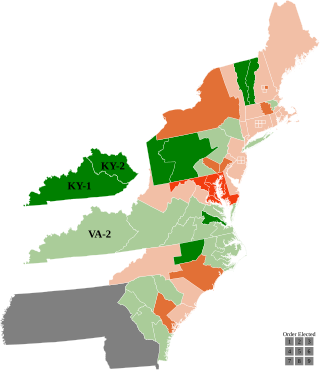A special election was held in Georgia's 1st congressional district on October 1, 1827 to fill a vacancy left by the resignation of Edward F. Tattnall (J) prior to the start of the 20th Congress.
| Elections in Georgia |
|---|
 |
A special election was held in Georgia's 1st congressional district on October 1, 1827 to fill a vacancy left by the resignation of Edward F. Tattnall (J) prior to the start of the 20th Congress.
From 1792 until 1824, Georgia had elected its representatives at-large. In 1826, Georgia switched, for that election only, to using districts. In the new 1st district, Edward F. Tattnall (J) was re-elected to a 4th term, but resigned before the start of the 20th Congress.
| Candidate | Party | Votes [1] | Percent |
|---|---|---|---|
| George R. Gilmer | Jacksonian | 21,008 | 63.5% |
| Thomas U. Charlton | Unknown | 12,094 | 36.5% |

The 5th United States Congress was a meeting of the legislative branch of the United States federal government, consisting of the United States Senate and the United States House of Representatives. It met at Congress Hall in Philadelphia, Pennsylvania, from March 4, 1797, to March 4, 1799, during the first two years of John Adams' presidency. In the context of the Quasi-War with France, the Alien and Sedition Acts were passed by Congress. The Acts were overwhelmingly supported by the Federalists and mostly opposed by the Democratic-Republicans. Some Democratic-Republicans, such as Timothy Bloodworth, said they would support formally going to war against France but they opposed the Alien and Sedition Acts which Bloodworth and others believed were unconstitutional.

The 1996 United States House of Representatives elections was an election for the United States House of Representatives on November 5, 1996, to elect members to serve in the 105th United States Congress. They coincided with the re-election of President Bill Clinton. Democrats won the popular vote by almost 60,000 votes (0.07%) and gained a net of two seats from the Republicans, but the Republicans retained an overall majority of seats in the House for the first time since 1928.

1914 United States House of Representatives elections were elections for the United States House of Representatives to elect members to serve in the 64th United States Congress. They were held for the most part on November 3, 1914, while Maine held theirs on September 14. They were held in the middle of President Woodrow Wilson's first term.

The 47th United States Congress was a meeting of the legislative branch of the United States federal government, consisting of the United States Senate and the United States House of Representatives. It met in Washington, D.C. from March 4, 1881, to March 4, 1883, during the six months of James Garfield's presidency, and the first year and a half of Chester Arthur's presidency. The apportionment of seats in this House of Representatives was based on the 1870 United States census. The House had a Republican majority; the Senate was evenly divided for the first time ever, with no vice president to break ties for most of this term.

The 54th United States Congress was a meeting of the legislative branch of the United States federal government, consisting of the United States Senate and the United States House of Representatives. It met in Washington, D.C., from March 4, 1895, to March 4, 1897, during the last two years of Grover Cleveland's second presidency. The apportionment of seats in the House of Representatives was based on the 1890 United States census. The House had a Republican majority, and the Republicans were the largest party in the Senate.

The 1840–41 United States House of Representatives elections were held on various dates in various states between July 6, 1840, and November 2, 1841. Each state set its own date for its elections to the House of Representatives, before or after the first session of the 27th United States Congress convened on May 31, 1841. Elections were held for all 242 seats, representing 26 states.

The 1828–29 United States House of Representatives elections were held on various dates in various states between July 9, 1828, and October 5, 1829. Each state set its own date for its elections to the House of Representatives before the first session of the 21st United States Congress convened on December 7, 1829. Elections were held for all 213 seats, representing 24 states.

The 1826–27 United States House of Representatives elections were held on various dates in various states between July 3, 1826, and August 30, 1827. Each state set its own date for its elections to the House of Representatives before the first session of the 20th United States Congress convened on December 3, 1827. They occurred during John Quincy Adams's presidency. Elections were held for all 213 seats, representing 24 states.
The 1820–21 United States House of Representatives elections were held on various dates in various states between July 3, 1820, and August 10, 1821. Each state set its own date for its elections to the House of Representatives before the first session of the 17th United States Congress convened on December 3, 1821. They coincided with President James Monroe winning reelection unopposed.
The 1818–19 United States House of Representatives elections were held on various dates in various states between April 26, 1818 and August 12, 1819. Each state set its own date for its elections to the House of Representatives before the first session of the 16th United States Congress convened on December 6, 1819. They occurred during President James Monroe's first term. Also, newly admitted Alabama elected its first representatives in September 1819, increasing the size of the House to 186 seats.

The 1812–13 United States House of Representatives elections were held on various dates in various states between August 3, 1812, and April 30, 1813. Each state set its own date for its elections to the House of Representatives before the first session of the 13th United States Congress convened on May 24, 1813. They coincided with James Madison being re-elected president.

The 1792–93 United States House of Representatives elections were held on various dates in various states between August 27, 1792, and September 6, 1793. Each state set its own date for its elections to the House of Representatives before the first session of the 3rd United States Congress convened on December 2, 1793. With the addition of the new state of Kentucky's representatives, and the congressional reapportionment based on the 1790 United States census, the size of the House increased to 105 seats.

The 1790–91 United States House of Representatives elections were held on various dates in various states between April 27, 1790, and October 11, 1791. Each state set its own date for its elections to the House of Representatives before or after the first session of the 2nd United States Congress convened on October 24, 1791. This was the first midterm election cycle, which took place in the middle of President George Washington's first term. The size of the House increased to 67 seats after the new state of Vermont elected its first representatives.

The 1788–89 United States House of Representatives elections were the first U.S. House of Representatives elections following the adoption of the Constitution of the United States. Each state set its own date for its congressional elections, ranging from November 24, 1788, to March 5, 1789, before or after the first session of the 1st United States Congress convened on March 4, 1789. They coincided with the election of George Washington as the first president of the United States.
Josiah Tattnall was an American planter, soldier and politician from Savannah, Georgia. He represented Georgia in the U.S. Senate from 1796 to 1799, and was the 25th Governor of Georgia in 1801 and 1802. Born near Savannah, Georgia, at Bonaventure Plantation in the early 1760s to Mary Mullryne and Josiah Tattnall, he studied at Eton School before joining Anthony Wayne's troops at Ebenezer during the American Revolutionary War. After the war, he was elected brigadier general of the 1st Regiment in the Georgia Militia. He helped to rescind the Yazoo land fraud of 1795. He died in Nassau, New Providence.
Edward Fenwick Tattnall was an American politician, soldier and lawyer.

A special election was held in Georgia's 2nd congressional district in 1827 to fill a vacancy caused by the resignation of John Forsyth (J).